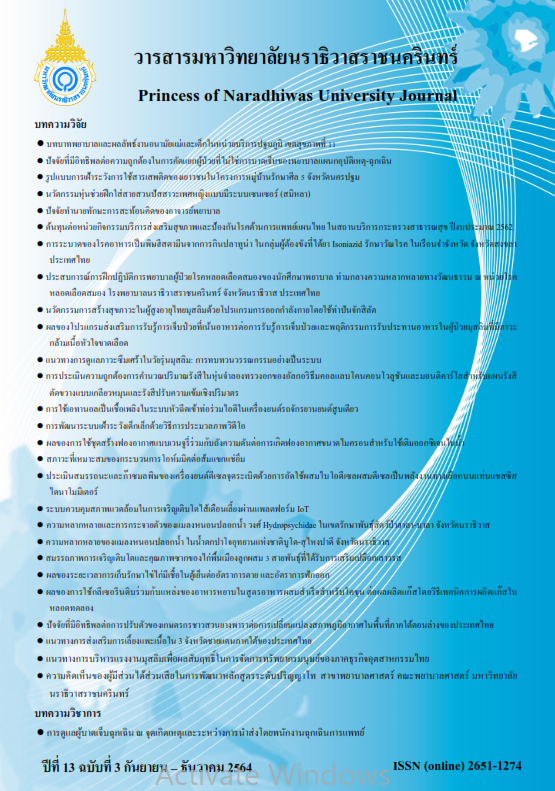Guidelines for Muslim Adolescents with Depression: A Systematic Review
Keywords:
Guideline for Depression, Muslim Adolescents, A Systematic ReviewAbstract
Depression is the cause of illness loss of well-being, and the rate of depression has continually increased among Muslim adolescents. The guideline for depression is very important for the prevention of health problems especially suicide. This systematic review of literature review intended to review the research studies related to guidelines for Muslim adolescents with depression from electronic databases and manual searching during 2010 to 2020. That proceeded as the systematic review concept of Joanna Briggs Institute. The researches selected by using the inclusion criteria form that was developed by the researcher. A total of 94 studies were found related to the topic; however, nine studies matched with the criteria, which five studies were experimental studies and the other four studies were quasi – experimental studies.
The results of this systematic review revealed that, the concepts and theories of the nine studies were psychosocial theories which consisted of the cognitive theories, humanistic or existential theories, and behavioral theories. Activities for adolescents with depression and process to provide care consisted of two ways, using positive psychology according to humanistic concepts and the adjustment of thinking and behavior according to cognitive and humanistic concepts. The therapy sessions were about 5 to 10 times, 45-120 minutes per session, and a self-report was used for assessment. The results revealed that the psychosocial therapy is an effective way to reduce depressive stress and anxiety symptoms. The qualitative approach should be used for investigating other significant features of guidelines including in-depth phenomena of clinical practices for further research.
References
Ahmed, S., & Amer, M.M. (Eds.). (2013). Counseling Muslims: Handbook of mental health issues and interventions. New York: Routledge.
Beck, J.S. (1995). Cognitive Therapy: Basics and Beyond. New York: The Guilford Press.
Bella, Awusah, T., Ani, C., Ajuwon, A., & Omigbodun, O. (2016). Effectiveness of brief school based, group cognitive behavioral therapy for depressed adolescents in south west Nigeria. Child and Adolescent Mental Health, 21(1), 44-50.
Chunjam, S., Sangon, S., & Thaweekoon, T. (2011). A survey of depression research in Thailand. Ramathibodi Nursing Journal, 17(3), 412-429.
Ciftci, A., Jones, N., & Corrigan, P.W. (2013). Mental health stigma in the Muslim. Journal of Muslim Mental Health, 7(1), 17-32.
Department of Mental Health. (2017). Annual Report 2017. Retrieved May 30, 2020 from https://www.dmh.go.th/download/Ebooks/Annual_report_2017.pdf.
Fournier, J.C., DeRubeis, R.J., Hollon, S.D., Dimidjian, S., Amsterdam, J.D., & Fawcett, J. (2010). Antidepressant Drug Effects and Depression Severity: a Patient-Level Meta-Analysis. JAMA, 303(1), 47-53.
Hamdan-Mansour, A.M., Puskar, K., & Bandak, A.G. (2009). Effectiveness of cognitive-behavioral therapy on depressive symptomatology, stress and coping strategies among Jordanian university students. Issues in Mental Health Nursing, 30(3), 188–196.
Gartlehner, G., Gaynes, B.N., Hansen, R.A., Thieda, P., DeVeaugh-Geiss, A., & Lohr, K.N. (2008). Comparative Benefits and Harms of Second-Generation Antidepressants: Background.
Jaber, R.M., Farroukh, M., Ismail, M., Najda, J., Sobh, H., Hammad, A., & Dalack, G.W. (2015). Measuring depression and stigma towards depression and mental health treatment among adolescents in an Arab-American community. International Journal of Culture and Mental Health, 8(3), 247-254.
Joanna Briggs Institute For Evidence Based Nursing & Midwifery. (2011). Joanna Briggs Institute Reviewer’s Manual: 2011 edition. Retrieved May 20, 2020, from https://docplayer.net/ 1411720-Joanna-briggs-institute-reviewers-manual-2011-edition.html.
Khaledian, M., Morovat, Q., & Moradi, N. (2016). Effects of Spirituality Therapy with Emphasis on Islamic Teachings on the Depression Symptoms and Adaptability of the Students with Abnormal Grief. World Scientific News, 57, 220-227.
Mahmoudi, H., & Khoshakhlagh, H. (2018). The effectiveness of positive psychotherapy on psychological well-being and self-esteem among adolescents with depression disorder. Social Behavior Research & Health, 2(1), 153-163.
Mamah, P., Suttharangsee, W., & Vanaleesin, S. (2015). The Effect of Islamic Scripture-Based Positive Self-Talk Program on Depression Among Female Muslim Adolescent Students. Journal of the Psychiatric Association of Thailand, 60(3), 193-200.
Mama, N., Niree, M., & Tuweakaji, K. (2014). Effect of Islamic CBT among Chronic Illness and Depression Elderly. Yuparat Journal, 4(1), 36-39.
Nadeem, M., Ali, A., & Buzdar, M.A. (2017). The Association Between Muslim Religiosity and Young Adult College Students’ Depression, Anxiety, and Stress. Journal of Religion and Health, 56(4), 1170-1179.
National Statistical Office. (2014). View of Thailand’s culture and mental health. Retrieved May 30, 2020 from https://www.m-society.go.th/article_attach/14497/18156.pdf.
Neshat-Doost, H.T., Dalgleish, T., Yule, W., Kalantari, M., Ahmadi, S.J., Dyregrov, A., & Jobson, L. (2013). Enhancing autobiographical memory specificity through cognitive training: An intervention for depression translated from basic science. Clinical Psychological Science, 1(1), 84-92.
Robatmili, S., Sohrabi, F., Shahrak, M.A., Talepasand, S., Nokani, M., & Hasani,M. (2015). The Effect of Group Logotherapy on Meaning in Life and Depression Levels of Iranian Students. International Journal for the Advancement of Counselling 37, 54–62
Sharifi, M. & Kaveh, M. (2013). The Effect of Teaching Coping Strategies on the Mental Health of 13-17 Male Adolescents Living in Boarding Houses of Tehran. Procedia Social and Behavioral Sciences, 84, 514-519.
Taghvaienia, A., & Zonobitabar, A. (2020). Positive intervention for depression and teacher-student relationship in Iranian high school girl students with moderate/mild depression: a pilot randomized controlled trial. Child and Adolescent Psychiatry and Mental Health, 14(25), 1-10.
Tapinta, D. (2013). Depression: Cognitive Behavior Counseling (3th ed.). Chiangmai: Wanida press. (in Thai).
Tapinta, D. (2015). Cognitive Behavior Counseling. Nursing Journal, 42(1), 205-213.
Tuntivivat, S. (2017). Positive Psychology: Development, Applications and Challenges. Journal of Behavioral Science for Development, 9(1), 277-290.
Zafar, H., & Khalily, M.T. (2015). Didactic therapy for management of stress and co-morbid symptoms of depression and anxiety in Pakistani adolescents. Pakistan Journal of Psychological Research, 30(1). 131-149.




